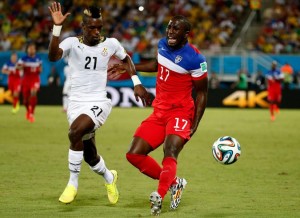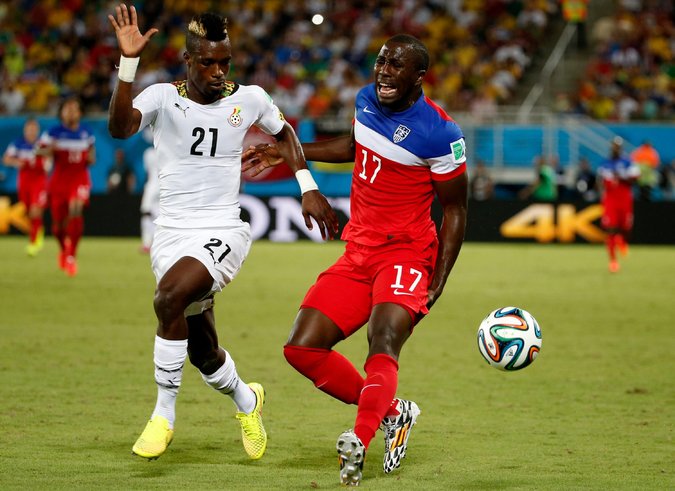To celebrate the World Cup in Brazil, Dear Sports Fan is publishing a set of posts explaining elements of soccer. We hope you enjoy posts like Why do People Like Soccer? How Does the World Cup Work? Why Do Soccer Players Dive so Much? What is a Penalty Kick in Soccer? What are Red and Yellow Cards in Soccer? and Why do World Cup Soccer Players Blame the Ball? The 2014 World Cup in Brazil begins on June 12 and ends on July 13.

The United States made it through the “group of death” into the single-elimination knockout round where we play Belgium at 4 p.m. on July 1. The game will be televised live on ESPN. It will be an incredibly anticipated game and although it may not get the high television ratings of the weekend game against Portugal, millions of people will be watching brazenly in bars or outside viewing areas or surreptitiously at their desks at work. If you’re thinking of being one of those people, here’s some information about the game which will help you sound knowledgeable and, I hope, enjoy the game!
Cohesion vs. Talent
Belgium is definitely the favorite to win this game. Although even soccer fans do not think of Belgium as being a world-class soccer country, by focusing on player development and then exporting players to the top European leagues, the Belgians have created a team full of world-class players. Sam Knight of Grantland.com wrote a wonderful profile of the Belgian team before the World Cup where he describes the develop and export approach and delves into the social impact that the rise of the Belgian team is having on the Belgian people. The Belgian team won its group comfortably, conceding only one goal against, but still failed to convince viewers of its dominant play. CBSSports.com described the Belgian performance as creating “the overarching impression was of a team that hasn’t yet found the team cohesion to match its individual quality.”
The United States, on the other hand, has played and acted like a very cohesive team. They’ve overcome an injury to their most irreplaceable (if not important) player. They took an enormous gut-punch when Portugal scored in stoppage time to tie their second game at two goals apiece and tear a definite spot in the second round away from them. Unperturbed, the United States played very well in their third game against a superior German team. The players on the U.S. team don’t all play at top-tier teams like the Belgians do but they do seem to play well as a team. Credit for this is hard to accurately distribute but it certainly seems like Coach Jurgen Klinsmann deserves a lot of it.
Goaltenders
This game features two of the best goalies in the world, Tim Howard of the United States, and Thibaut Courtois for the Belgians. Both goalkeepers star in the English Premiere League — Howard for Everton and Courtois for Chelsea. Playing goalie in soccer is a somewhat crazy thing to do because your chances of being humiliated is so high and it attracts, shall we say, colorful personalities. Howard is definitely that. He’s a classic product of New Brunswick, NJ, (where I went to college, hooray for Rutgers,) being half African-American and half Hungarian, the two dominant groups in the city. He was diagnosed with Tourette’s syndrome as a child and has been a very admirable and open spokesperson for people with the syndrome. Interestingly, there’s some thought, like from this soccerblog.com article from 2010, that Tourette’s helps Howard “sense things in the body movements of others that the rest of us screen out, some signal or vibration, some sensory cue. It’s almost like they can see what’s going to happen before it happens.” If true, that would be quite an advantage for a goalkeeper! Tourette’s is best known for causing verbal outbursts, sometimes vulgar, from people who have the syndrome. Howard screams at his defenders, but don’t kid yourself, that’s just part of the job and he does it well. While the 35 year-old Howard is at the end of his career, the 22 year-old Courtois is just beginning. He inspired a parody of the American Football Tebowing meme with people “Thibauting” by taking pictures of themselves pretending to make amazing saves. Courtois highlights are amazing.
Injuries
After three hard group-stage games, it’s no surprise that injuries are going to be a theme of the games in the knockout stage. Both teams have important players who are either going to miss the game or play at less than full strength.
Belgium
The most important injury on the Belgian side is to its most important player, Vincent Kompany. Kompany anchors the Belgian defense and is something of a spiritual leader for the young team. In a glowing New York Times profile, a fellow defender describes Kompany as, “He’s like the father of the team, taking care of everything and everyone.” He strained his groin in a group match and may not be able to play. The Belgians also have players with a pulled hamstring, a strained abductor, and a cracked fibula. Safe to say, they are not at full strength.
The United States
While we are likely to hear a lot about the twin broken noses of Clint Dempsey and Jermaine Jones (coincidentally the two best players for the US team so far,) the only truly significant injury for team U.S. is Jozy Altidore. Altidore, as you may remember, went down in the first half of the first game of the World Cup clutching his hamstring. He’s a big, strong, offensive player who excels at controlling a long pass and holding the ball while his teammates sprint up the field to join the attack. The U.S. doesn’t really have a player who can replace what Altidore does on the field, so for the last two games the team has played without anyone in that position. Altidore is a big question mark for the game against Belgium. Can he play? If he does play, how well and how long can he play for? Will he be used as a second-half sub if the team is down? If he plays, will the other players adjust well to having him back or have they gotten too used to playing without him?
The Result?
Who can say? It’s going to be a nail-biter. Go USA!

